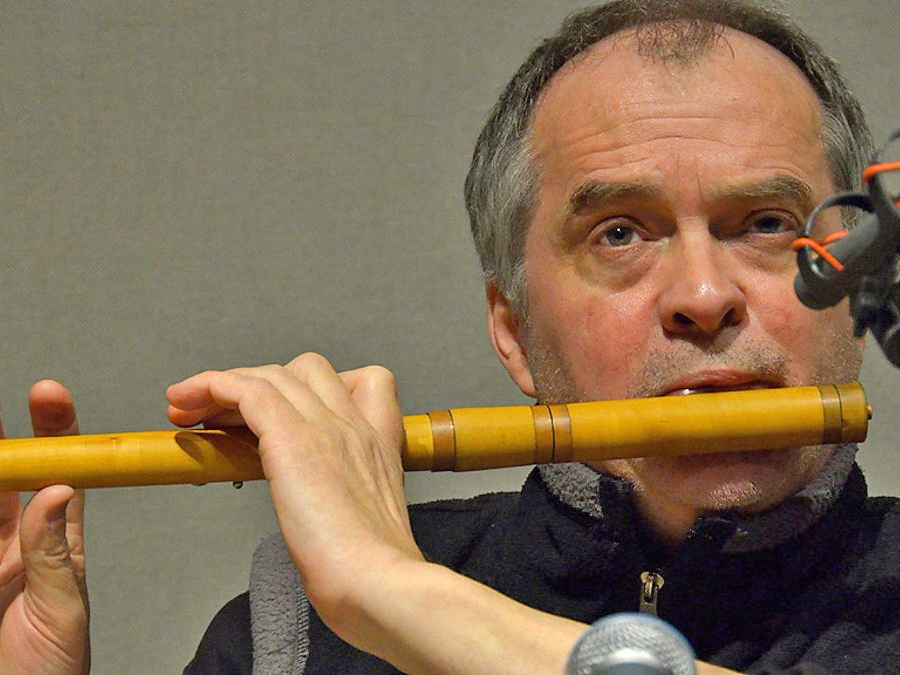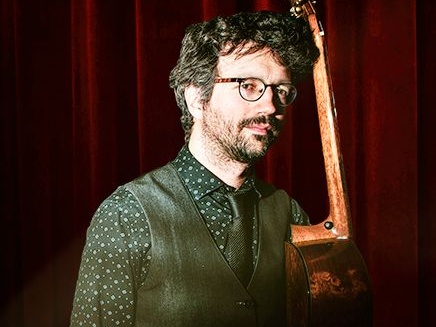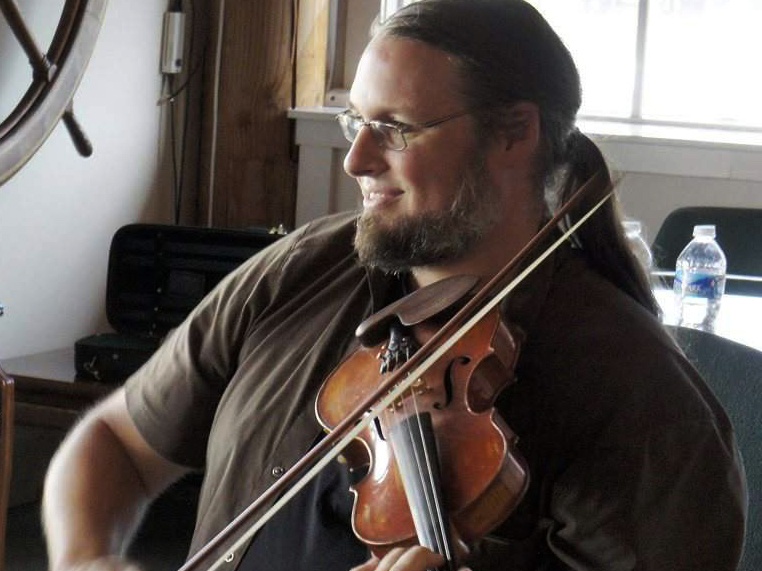TRANSCRIPT
CHRIS NORMAN: Hi, I’m Chris Norman and you’re listening to Boxwood’s Artist Huddle – Conversations. Our August 15th 2020 Artist Huddle, featured the Irish flute player Tara Diamond to talk about her influences and life-long passion for traditional Irish music on the flute and whistle. Later on, she’s joined by her husband Dermy Diamond for a few tunes.
So, Tara I wondered if you could tell me a little bit about how you got started? You’re originally from County Down and I’m curious about that moment when you first heard the flute, or heard the whistle, heard traditional music and what that looked like and how you got your start?
TARA DIAMOND: My father was a flute player, flute and whistle player, so it was really from listening to him. I didn’t want to learn the flute at all, I wanted to learn the pipes. You know when I began to listen to music and realized, found out about the different instruments, the pipes were the ones that appealed to me the most. I play left-handed and it was really difficult in those days to pick up a left-handed practice set, and also very expensive. So, I just ended up with a flute because there was a flute in the house.
CHRIS NORMAN: Right, so did you Dad play left-handed as well, Tara?
TARA DIAMOND: No, he didn’t, he played right-handed.
CHRIS NORMAN: Uh-huh, was that an issue when you got started? Did he ever try to steer you in a right-handed direction?
TARA DIAMOND: No, he said the way you take it up, the way you lift it up should be the way you play it. He didn’t correct me, and I didn’t have a teacher as such, um, he used to write tunes out and sort of insist that we learn them, myself and my brothers. But none of us read music so he would give us the ABCs or he would give us a recording on a tape, on a big reel-to-reel tape recorder to learn from. We didn’t learn tunes directly from him, he just encouraged us to learn at that stage.
CHRIS NORMAN: That’s fantastic. And you bumped shoulders with some legends of traditional Irish music in the north there, Paddy Tyrrell.
TARA DIAMOND: Paddy Tyrrell – we pronounce it ter’-el – he used to come play in our house when we were young and he gave me lots of pointers because my Dad was only really a few steps ahead of us all, and Paddy was more advanced, and he played jazz on the silver flute as well.
CHRIS NORMAN: Right, he’s a name that you come across regularly but there aren’t many recordings of him, so tell me a little bit about his playing.
TARA DIAMOND: He played traditional music but it really wasn’t really, you know, it was on the silver flute so he probably was a bit restricted in the ornamentation and that wasn’t the same ornamentation as I would do on the wooden flute. But he did teach me how to do rolls when I was about 14, 13 and I couldn’t get the hang of them at all, and he sat down with me one day and showed me what to do that that was a huge benefit, a huge help. And he also told me to practice breathing exercises on the floor, lying on the floor with a book on my stomach …
CHRIS NORMAN: [Laughs] That one has gone the world around, hasn’t it? With opera singers and flute players and… And who else did you come into contact with early on with?
TARA DIAMOND: Cathal McConnell came to stay at the house several times. Tom McHale, who’s a whistle player who’s no longer with us.
CHRIS NORMAN: Yes, of course everyone knows Cathal, we actually had him to Lunenburg last summer, that was his second visit to Boxwood, so we’re all well acquainted with Cathal.
TARA DIAMOND: He’s a character.
CHRIS NORMAN: Tell us a little bit about Tom, he’s another musician you hear about but there aren’t many recordings of.
TARA DIAMOND: There’s one recording actually, I think, of himself and a guitarist called Denny Warwick. I’m not sure how widely available it is. He was a really, really good whistle player, you know, he had lovely variations. A limited repertoire but what he played, he played really, really well. And I suppose you describe him as a likable rogue. I was too young really, to realize. He used to come and stay with people and you know, he’d run up debts and bills and things. He’d borrow money and then he’d disappear, he’d go somewhere else. But everybody just, he was so likeable that people, they just sort of shrug their shoulders and never invite him back to the house again. He was a really nice man.
CHRIS NORMAN: And when did you move out of County Down?
TARA DIAMOND: I moved to Belfast from County Down when I got married in 1977, and we lived there for 10 years until 1987, just outside Belfast. Dermy, who’s a fiddle player, my husband and myself and then in 1987 we moved to the house I’m in now, in Dublin. So, we don’t live here all the time, but we’re here because we’re having a big job done in the garden. We’re having some trees felled.
CHRIS NORMAN: OK, we’ll watch out for the chainsaw sounds.
TARA DIAMOND: I don’t think you’ll hear it, it’s a very big garden, so it’s a good distance from where they’re working.
CHRIS NORMAN: So, with your flute playing Tara, how do you feel that the northern style has informed your own thinking about flute playing? Of course, with fiddle playing, a northern style, a more articulated style is something that everybody recognizes. But as flute players, it’s a little murkier, I’m curious to hear your thoughts on a northern flute style.
TARA DIAMOND: I don’t, I’m not actually convinced that there is a northern flute style. I think flute playing is very strong in the north. But I think individually the flute players are very different, if you listen to them, you know, there’s not a common style. I mean, I’m thinking of people like Davy Maguire, Michael Clarkson, Harry Bradley. Um, I suppose, myself, Gerry O’Donnell, from Fermanagh.
CHRIS NORMAN: Right
TARA DIAMOND: There’s a few, that’s just off the top of my head. There are more of course, we all play very differently.
CHRIS NORMAN: Yeah, and I think that’s healthy, it does seem that with our connectedness now, it does seem like regional styles, individual styles sometimes get the corners rubbed off of them. People tend to sound a bit more like each other, or, you know, the style du jour. And I think that’s a healthy thing.
TARA DIAMOND: So, I wouldn’t think that I’ve got a northern style. I don’t know, maybe it’s more the tone, you know, people concentrate on the tone more. You know, they’re not so worried about variations, the tone is the big thing. It could be that, I don’t really know.
CHRIS NORMAN: Hmmm
TARA DIAMOND: Oh, Desi Wilkinson was the other person I was thinking of, you know who Desi is…
CHRIS NORMAN: Yes, indeed
TARA DIAMOND: So, we don’t have a common style, I don’t think, any of us northern flute players.
CHRIS NORMAN: Now, one of our mutual friends is Dáithí Sproule, what was your first contact with Dáithí?
TARA DIAMOND: Oh, my goodness, I can’t actually remember, it’s so long ago, I just seem to have known Dáithí forever [laughs] So, it must have been the nineteens, it could have been Dublin, because I know Dáithí lived there for a short while before he moved.
CHRIS NORMAN: Yes
TARA DIAMOND: I honestly don’t remember where I met Dáithí.
CHRIS NORMAN: I first became aware of you when I first met Dáithí, and it was lovely, it was on a visit out to Minneapolis-St Paul, I think about 1986 or so. It was a brief period when the Irish Tradition with Billy McComiskey and Brendan Mulvihill, when that was a six piece and I was playing in that group. Anyway, that’s when I first met Dáithí and he was singing your praises at that time. So, this is a real treat to finally get to meet you.
TARA DIAMOND: Ah, thank you. I met Dáithí and Paddy O’Brien, Paddy O’Brien the accordion player who also lived there, left around the time Dáithí moved? He would have been a friend of my father’s, Paddy was, so I met him. He used to come to the house quite a lot. It wasn’t just flute players, we’d sort of different, it wasn’t all flute players. I always think I learned most of my music from fiddle players, and accordion players, you know, not flute players at all. [With husband Dermy on fiddle, plays two slip jigs – An Buachaillin Dreotie and Kitty Come Down from Limerick]
CHRIS NORMAN: To hear the complete Artist Huddle with Tara, among many others, and to receive my regular Tune of the Month videos, subscribe to us on Patreon at patreon.com/boxwood We’re grateful to you for your support and to Canadian Heritage, the Provence of Nova Scotia, and Culture Ireland. Thanks for listening.

On July 21, 2020, we had a visit with one of the all-time greats of Breton music, and perennial favorite at Boxwood, Jean-Michel Veillon....

From our August 31st 2020 Artist Huddle with Yann Falquet. TRANSCRIPT CHRIS NORMAN: Hi, I’m Chris Norman and you’re listening to Boxwood’s Artist Huddle...

Transcript CHRIS NORMAN: Hi, I’m Chris Norman and you’re listening to Boxwood’s Artist Huddle – Conversations. In our July 12th 2020 Artist Huddle, we...